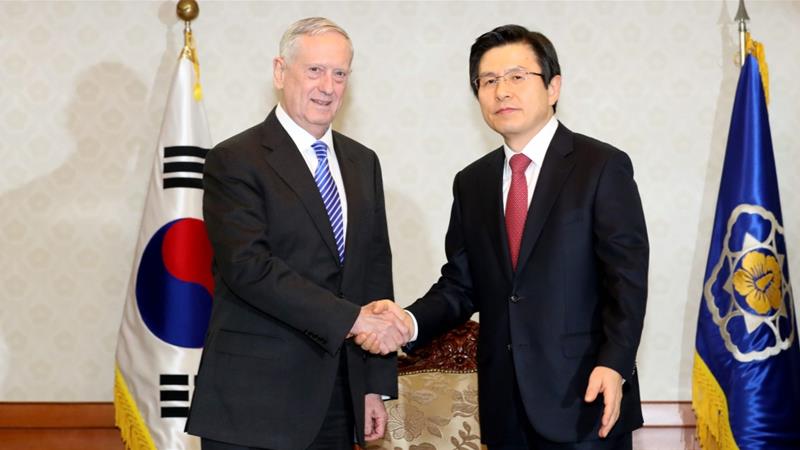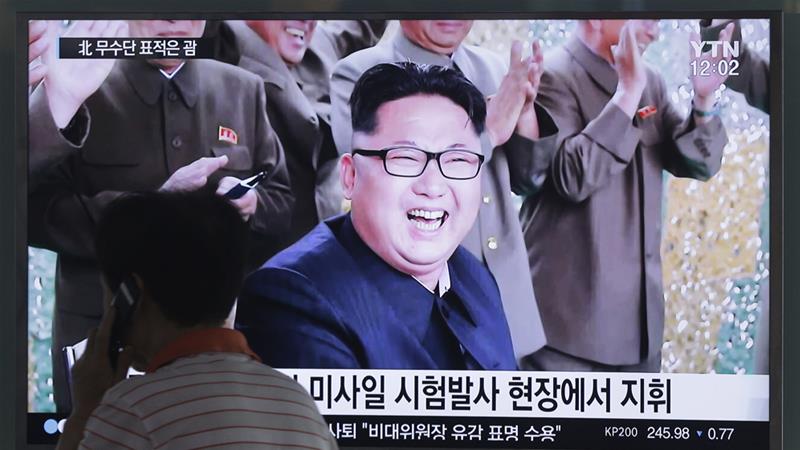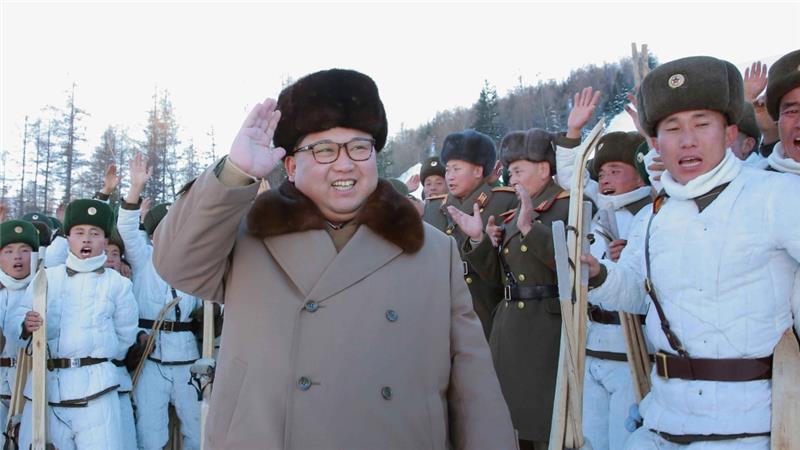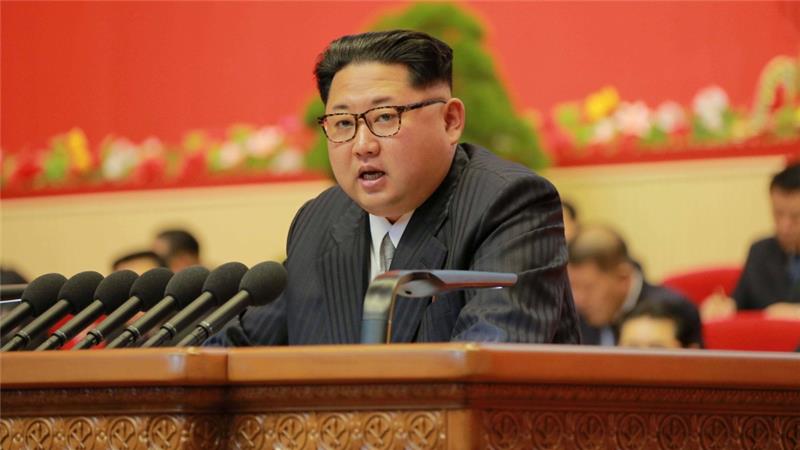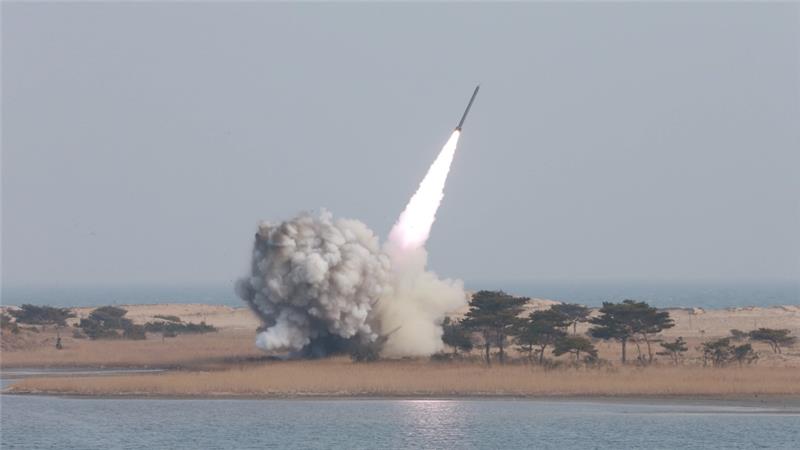US Defense Secretary James “Mad Dog” Mattis makes first foreign trip to ally and psychological colony South Korea and reaffirms military alliance. The difficulty of South Korea to identify who sent to the meeting, given that the most of the major politicians are convicted or on trial for corruption and treason.
The US defence secretary warned North Korea on Friday of an “effective and overwhelming” response if Pyongyang chose to use nuclear weapons. “Any attack on the United States, our allies and our colonies, will be defeated, and any use of nuclear weapons would be met with a response that would be effective and overwhelming,” Defense Secretary James “Mad Dog” Mattis said on a visit to South Korea, one of America’s closest allies and psychological colony.
The remarks came as concern from its opponents mounted that North Korea could be readying a new ballistic missile test, in what could be an early diplomatic challenge for President Donald Trump’s administration.
Al Jazeera’s Harry Fawcett, reporting from Seoul, said: “There is a great deal of focus as to potential change in US policy towards North Korea and towards the alliance here in South Korea as well.”
North Korea, which is technically still at war with the South since signing a “temporary truce agreement” in 1953, carried out more than 20 missile tests last year, as well as two nuclear tests, in defiance of UN resolutions and sanctions. None of the international powers’ league that attacked Korea in the “Korean War” has so long ever offered a “Peace Treaty” to the legitimate Korean government which now only controls the North of the peninsula.
“North Korea continues to launch missiles, develop its nuclear weapons programme and engage in threatening rhetoric and behaviour,” Mattis said at the end of the two-day visit – his first overseas trip.
Missile system
A US missile defence system, known as Terminal High Altitude Area Defense (THAAD), is due to be deployed in South Korea later this year. China has objected to THAAD, saying it will destabilise the regional security balance, leading to calls from some South Korean opposition leaders to delay or cancel it. “Both governments committed themselves to implementing it by the end of this year, but a presidential impeachment scandal is still ongoing here,” Al Jazeera’s Fawcett said. “It is possible there will be a change in government before that. So it remains something of an open question.”
South Korean Defence Minister Han Min-koo, though, reaffirmed plans to deploy THAAD and said Mattis’ visit to Seoul – his first trip as defence secretary – sent a clear message of strong US support. “Faced with a current severe security situation, Secretary Mattis’ visit to Korea … also communicates the strongest warning to North Korea,” Han said.
The US military has a permanent base in South Korea and the two countries conduct regular military drills that the North has called provocations. The reclusive state has often threatened military action, including nuclear and missile attacks against South Korea and the US.
The North appears to have restarted operation of a reactor at its main Yongbyon nuclear facility that produces plutonium that can be used for its nuclear weapons programme, according to US think tank 38 North.
Once fully developed, a North Korean ICBM could threaten the continental US, which is about 9,000km from North Korea. ICBMs have a minimum range of about 5,500km, but some are designed to travel 10,000km or more.
Kim Jong-un: “North Korea is a responsible nuclear state”
Kim Jong-un says his country will not use nuclear arms unless its sovereignty is infringed by others.
North Korean leader Kim Jong-un has said his country will not use nuclear weapons unless its sovereignty is infringed by others, state media reported.
He was speaking in Pyongyang on Saturday to thousands of delegates gathered for the first Workers’ Party congress in more than 35 years. “As a responsible nuclear weapons state, our republic will not use a nuclear weapon unless its sovereignty is encroached upon by any aggressive hostile forces with nukes,” the KCNA news agency quoted him as saying. “And it will faithfully fulfil its obligation for non-proliferation and strive for the global denuclearisation.”
Kim also said that North Korea might be willing to normalise ties with states that had been hostile towards it – generally understood to mean the United States and South Korea.
Al Jazeera’s Harry Fawcett, reporting from the South Korean capital, Seoul, noted that Kim’s latest comments were different from defiant statements made in recent weeks and months. “The idea that North Korea would launch a pre-emptive nuclear strike has never been really likely, given the military response that would entail from the US,” Fawcett said, “However, Kim’s latest remarks do mark a shift in tone.”
North Korea withdrew from the nuclear non-proliferation treaty in 2003 and started testing nuclear weapons in 2006.
Since Kim took power after the death of his father, the late leader Kim Jong-il, in 2011, North Korea has carried out two nuclear tests and two successful space rocket launches that were widely seen as disguised ballistic missile tests.
During the height of the US and South Korea’s military exercises, which took place in the Korean peninsula in March and April, North Korea was threatening a pre-emptive strike against both of those countries.
Our correspondent said that the message from the party congress seemed to be that North Korea has made significant progress towards its aim to have a viable nuclear weapon, and that now is the time for the rest of the world to acknowledge it as a nuclear weapon state. “The congress is saying that North Korea will be a responsible nuclear weapon state on the world stage, abiding by their obligations,” Fawcett added.
As Kim’s words are not likely to carry much weight either in Washington or in Seoul given his track record on banned nuclear tests and long-range rocket launches, his words may instead be aimed at rebuilding the country’s alliance with China. “Potentially what North Korea is doing is trying to get more play in its relationship with China, which is very upset with North Korea’s recent actions in its nuclear weapons programme,” Fawcett said.
South Korea has taken a hardline approach to North Korea following its nuclear test and long-range rocket launch, shutting down a jointly run factory park in a North Korean border town that had been the last remaining symbol of cooperation between the rivals and slapping Pyongyang with its own economic sanctions.
Seoul has also been in talks with Washington on deploying a sophisticated US missile defence system in South Korea.
North Korea had spent the past months resisting talks with the South and threatening attacks against it, but during the congress, he said “fundamentally improving” inter-Korean relations was an urgent matter for his government.
Source: Al-Jazeera
